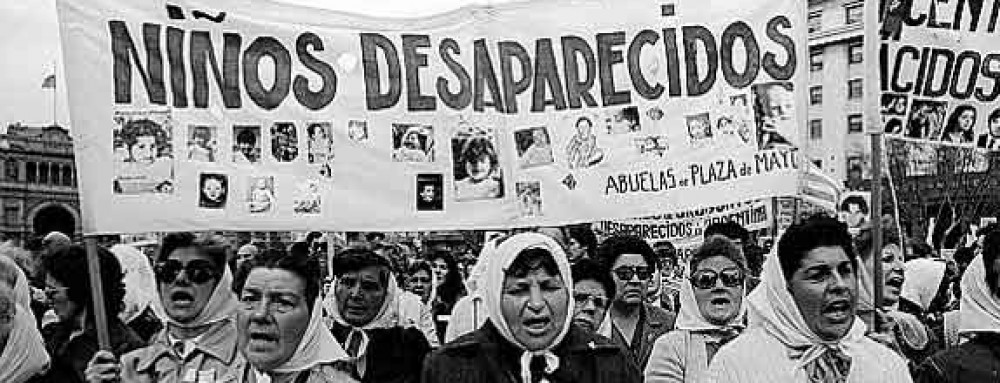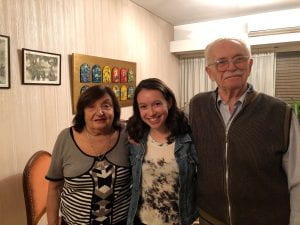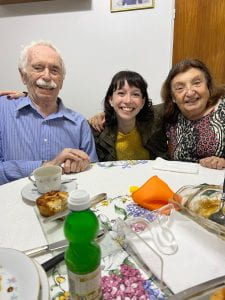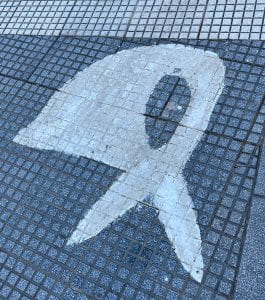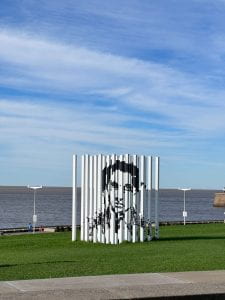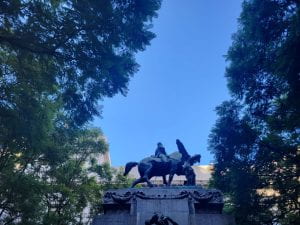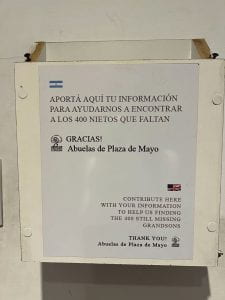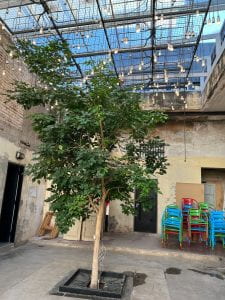I noticed this section on a shelf at D2 that contained banned books because of the rainbow, and my familiarity with the novel Kiss of the Spider Woman by Manuel Puig, which I know contains Gay themes. I asked Fernando about it, and he confirmed that all of the authors on the shelf were gay. I also asked if LGBTQ+ people were singled out despite their politics, and he responded that only political dissidents were held as prisoners. Given the history of dictatorships like Cuba and Nazi Germany putting LGBTQ+ in concentration camps, I do wonder why these books were banned, and if the community suffered any special persecution. With the anti-LGBTQ+ laws being passed in our country, should we be concerned about other Human Rights violations on the Horizon?
Category Archives: 4. What can/should U.S. society learn from the Argentine way of dealing with past trauma and present day human rights abuses?
Going Home
 When leaving Buenos Aires and returning to Atlanta I felt very tired, not from lack of sleep but from information overload. I learned a lot. And, a lot of this was very depressing. It will be good to get a good night’s sleep in my own bed. Maybe tomorrow I will be better able to process the whole trip.
When leaving Buenos Aires and returning to Atlanta I felt very tired, not from lack of sleep but from information overload. I learned a lot. And, a lot of this was very depressing. It will be good to get a good night’s sleep in my own bed. Maybe tomorrow I will be better able to process the whole trip.
The Argentines believe that since these bad things happened, they cannot just look the other way. They need to acknowledge the wrong doing and keep it fresh in the memory so that it never happens again. We also need to recognize that these bad things that happen elsewhere can happen here if we don’t acknowledge it and keep them fresh in our memory.
“Hay que aprovechar”
I feel compelled to express my heartfelt appreciation and gratitude to my host parents in Argentina, whom I feel blessed to have been able to visit. They are more than just a host family; they have become an integral part of my life, guiding, supporting, and shaping my experience in Buenos Aires and back home in the U.S.
My host mother Zulema always told me– both when I lived with her five years ago and when I saw her today– “hay que aprovechar.” This roughly translates to “you have to take advantage.” She mostly says this to me it in reference to traveling, visiting different countries, expressing your love, and living boldly. But I think this phrase applies aptly to one of the themes of our study abroad trip. What can we as students do to prevent violence, dictatorship, and trauma in our own country? What lessons can we take from what happened in Argentina and apply to our own country?
We can, and should, take advantage of what we have learned here in Argentina. We have all grown profoundly during this trip as students, listeners, observers, multilinguals, and human beings. As we are our own people, each of us will “aprovechar” in our own way– some may go into human rights work, others may go into law, others will integrate this growth into their lens as psychologists. For myself, this trip has changed the way I view the experience of trauma. I know this new perspective will undoubtedly influence my future clinical work. I look forward to seeing how each of us integrates these lessons into our work and our lives.
Parque de la Memoria
Our visit to Parque de la Memoria was a beautiful conclusion to our study of human rights in Argentina. As Fernando told us upon arrival, the park represents the duality of memory such that just as we must look back, so too must we look forward. The names of thousands of disappeared etched on walls in the park stand in contrast to families and students having picnics and taking a walk.
Located on the beautiful coastline of Rio de la Plata, we were able to look out to the water where many were disappeared and murdered via “transfers” – a euphemism for being drugged and thrown out of an airplane into the water. Such method of murder leaves no trace. The names of the disappeared are listed on long, sprawling walls in the park, with many slates blank and yet to be filled in. Large, unique sculptures are scattered throughout the park.
In remembrance of those who were disappeared, and in quiet reflection of our viaje, we placed the flowers that Fernando brought into Rio de la Plata. It was quiet, somber, and sobering.
For me, trying to imagine grieving a disappeared loved one feels like a profound and enduring hunger. There is a need to be satiated that will never be met. Small actions like offering flowers or visiting names perhaps chip away at the famine, but never satisfy it. I feel privileged to have experienced this trip and motivated to amplify the voices of the disappeared and their families. Every story is worth telling and every loss worth grieving. Each story gives way to similar loss, grieving, and erasure that has happened and will continue to happen in our home country. However small my individual impact may be, hearing these testimonies and stories has animated me to do my part in preventing future cyclical violence in the U.S.
To the next who looks for answers
Hola lamngen. Espero que estes bien, contente y feliz.
This is not an easy place to be. The worst of the US has happened, is still happening, or is starting to happen here for the most part. These lands are scarred by hatred and treachery, and have been covered in beautiful churches, palaces, and offices to distract you from that truth. The original inhabitants of these lands are very much still with us — Kamiare, Mapuche, Wichi, Chane, countless more — despite what your tour guides would have you believe.
These cities, Cordoba and Buenos Aires, have histories which extend incomprehensibly beyond when the Iberians invaded in the 1500s. The “conquerors” were not the first to make cities, and weren’t infallible heroes who were masters of their “craft”. In fact, the first one got what was coming to him pretty quickly and they had to get his boy from Spain to finish the job when they made the capital.
Despite what people tell you, it’s not acceptable to call Indigenous people “Indians” or Afrodescendent people “Blacks” — and whatever story they tell you to justify it is also unacceptable. These streets, buildings, waterways, all of this infrastructure and beauty that has become the pride of this nation would not have been possible without enslaving Africans and Indigenous people. These houses of worship, lined with gold and silver and ornate wood carvings, could only be built using enslaved labor and stolen materials.
You will walk into these memory sites and feel the heaviness that chokes the air and you with it. I ask you to do the same as you walk through the old city, through the cathedrals, the estancias, the ranches, and the palaces. Recall their histories just as you would for a recent site, because they still inflict the same traumas as they did 500 years ago. The only difference is that they’d never wrap a sitio de memoria in goldleaf.
No matter how good your intentions are or how well you speak English and Spanish, being a cultural mediator will become tiring. You will find yourself apologizing for the actions of others, perhaps because their intentions were lost in translation (or, really weren’t). You will become so tired that by the time you just need to speak for yourself to buy water, you won’t even be able to form the basic sentence. Often, those who ask for the most of you will give you the least thanks in return. These are pretty universal things, but they’re good to keep in mind specifically here.
This is a nation of beautiful people, cultures, and vistas that will take your breath away even on a tough day. You will likely have some of the most meaningful moments of your life here; little minutes that feel like hours, expressing something that an entire library would struggle to do — without words. I am enamored with just how much I have to learn and know about this place, and I’m so excited to come back under different circumstances.
If you come here looking for answers to questions like the ones I had, then I am certain you will find them. The journey is anything but easy, but I leave this country with a kind of heavy enlightenment about myself and our own country. Be kind to yourself, set healthy boundaries, rest, and don’t be afraid to try new things. Do be afraid of the street chori, though.
Also, bring hot sauce and your own spices. One bottle is not enough. And be familiar with the general plotline of Forrest Gump, at least toward the end of the movie. It becomes relevant here, you’ll see (mille grazie, profe).
Suerte,
D.
Estados culiados
“Fucked-up states”
Dr. Mary R. Harvey notes the following in Sources and Expression of Resilience in Trauma Survivors:
“Violence, abuse, tragedy, and catastrophe know no national boundaries. Indeed, they make themselves at home in nations, cultures, homes, and communities throughout the globe.”
Seems like one of those “no shit” kinda things at first, but really take a second to think about how terms like “genocide” and “ethnic violence” carry connotation in your head. What places and people come to mind? It’s going to be different for everyone; you might think Rwanda, I think Palestine, Bill thinks Sudan, etc.
Point is, you and I will be hard pressed to find estadounidenses whose first association with these terms is with the United States and other North American states. Between 400 years of slavery, genocide, invasion, developing the framework of concentration camps, and inhumane imprisonment, the US really should be everyone’s first, at least second answer.
Despite this, we’ve been enculturated through US media (manipulated by the state/oligarchy) to perceive our conditions as anything other than indicative of genocide. We came here to Argentina learning about how the repressors used euphemisms for things like torture and execution, but what about ours?
Here are some truly US euphemisms, with some translations I’ve provided. I think I get to say at this point I’m pretty alright at translating, cause I’ve been doing it the entire time:
- “Trail of Tears” – a death march against Indigenous Americans already weakened from invasion, plague, and treachery, which forced them and their descendents to live on reservations,
- “Reservation” – an open-air prison,
- “Forfeiture of one’s 13th Amendment rights” – forcibly enslaving someone,
- “Punishable by fine” – you can get away with it if you’re rich and white,
- “Died after police believed they saw a firearm” – murdered by an occupying military force with absolute impunity.
The list can go as long as we want it to, because this is a state and cultural entity obsessed with whitewashing. Why do you think we don’t have nationally-effective unions? Can we name a single unified student political front — and for the love of the Good Lord, don’t say the Young Democrats — that is able to effect change? Why is the US so different from Argentina, and why are the people who grow up buying into the US so different from those who don’t?
THE UNITED STATES IS A PRISON. It is a machine designed to create generation after generation of apathetic and complacent citizens, accepting the divine authority of the state before anything else. Sick? It’s your fault, pay for it. Arrested? Your fault, should have known better. House seized by the state with no compensation? Your fault again, should have paid for a better lawyer.
THE UNITED STATES IS A MONSTER. It feeds off of your blood, sweat, and tears and demands more until you’re dead and can’t say no anymore. It draws diasporas with hopes of an “American Dream” which will never come: it’s the bulb in front of the anglerfish — the only one who gets to benefit from the trick is the one doing the trick. You’ll spend your whole life’s savings trying to stay afloat here. Meanwhile your money is just going to line the pockets of some rich fuck in Hell’s Kitchen, who’s gonna spend your rent on blow and sashimi tonight.
One of my classmates on this program asked “if [I] hate America so much, if it’s so bad, then why do [I] even live there?”. We could unpack that a lot, but after these weeks here I’m gonna start charging for emotional labor by the minute — for now, let’s just keep it at that. We all know what that sentence leads to, and I thought it was pretty funny considering we’re abroad and not too far from “my country:.
To respond: something I stole from some anti-Charlie Kirk meme I saw a while ago.
“You hate feudalism? Yet you toil the lord’s land. Curious.”
To sum up this post, these countries are all damned from the start. We, as estadounidenses, just find ourselves on a different, more progressed branch of imperialism/capitalism. Is there hope? I hope so! Did I learn here? Of course! Was it worth it to come here? Absolutely. Was it easy? Fuck no. Does the constant cycle of micro/MACROaggressions, interpreting, undercooked meat, and big walks take a toll on your health? Yes, next time I’ll bring more vitamin C and DayQuil.
ALHAMDULLILAH IN ANY CASE
Reflection on Club Atlético
Club Atlético, buried under a highway in Buenos Aires, was never an athletic club at all: it was a euphemistically named secret torture site, one of many around Argentina. It was formerly the basement of a police building. Like many others, it displayed photos of its victims who never returned home. At first, you are overwhelmed by the wall of faces, but then your eyes begin to settle on individual people. There was another installation involving only names, but I find that the photos tell the people’s stories and humanize them in a unique way. This site also had objects left behind when the site was abandoned, which made what happened feel more concrete. Something else that I thought was important was that it included a map showing the United States’ role in installing dictators not just in Argentina but across Latin America through Plan Condor. This is not just Argentina’s history but U.S. History and needs to be taught and understood in the U.S. as well. I don’t believe many Americans know about this at all, and I only learned about it later on in high school, in a specific Latin American history class. While I’m glad I was taught about it, it was interesting it only came up in Latin American history and not U.S. history. We claim to be about freedom and democracy, yet have installed dictators all over the world to further our interests. This is yet another example of why it is important not to whitewash history, and why the latest attacks on education in the U.S. are so harmful. We have discussed how not all schools in Argentina teach about human rights, though they’re supposed to, but at the same time Black history, anything LGBTQ related and even a variety of books are being banned in parts of our own country. It’s important to learn about human rights issues across the world, but we must remember they are not something that happen solely in other countries, unrelated to us.
Taking Lessons Back to the U.S.

From Virrey Cevalles earlier today. These people were disappeared from nearby neighborhoods but weren’t taken to this specific site. I found it heartening that these people were honored even in places they didn’t necessarily step into.
A lot of connections can be made between Argentine and American histories. Though the events themselves weren’t the same, there were repercussions impacting generations of families and the structure of society in general. One difference, though, is the effort going into pursuing justice on a more national level. When Néstor Kirchner was elected in 2003, he made strides to prosecute those responsible for human rights violations during the dictatorship. He annulled legislation that prevented the prosecution of military personnel. That step alone is huge in bringing justice to families of the disappeared and victims who were imprisoned/tortured. The United States never saw trials convicting slave owners of their crimes against humanity – and now it’s too late for that specific issue. But we see similar behavior when it comes to issues like police brutality against black and brown people. It seems much more difficult to convict such a police officer. Another big discussion in the United States is around reparations, which Argentina has been able to provide for children or grandchildren of the disappeared. We know that trauma is generational, and impacts every aspect of life.
One thing we’ve learned is there is still a culture of silence in parts of Argentine society. “What’s worse than not wanting to know is wanting not to know.” This idea permeates American culture and is one of the greater barriers to social change. Younger generations seem to be pushing to break this, but it is difficult when people are advocating to not teach schoolchildren basic American history. We must know in order to not repeat the past. Nunca Mas.
Argentine political culture is driven by the past and its horrors. It’s heartening to see and meet so many people dedicating their time and lives to change. The United States needs to face its past in totality.
Reflections
 This picture is not what it seems. It is a picture of the room inside of D2 that contains all the photographs of the victims. (See the faces on the door.) However, it is shot through the glass window which is reflecting the church across el Pasaje Santa Caterina. The overpowering image of the church mimics the influence of the church in Argentina at the time. How complicit was the Church? Surely the clergy had to know about these atrocities since they were happening literally next door. Surely parishioners would have confided in them and asked for help. Could they have done anything about it? Did they help in the inquisition? How do they deal with their guilt?
This picture is not what it seems. It is a picture of the room inside of D2 that contains all the photographs of the victims. (See the faces on the door.) However, it is shot through the glass window which is reflecting the church across el Pasaje Santa Caterina. The overpowering image of the church mimics the influence of the church in Argentina at the time. How complicit was the Church? Surely the clergy had to know about these atrocities since they were happening literally next door. Surely parishioners would have confided in them and asked for help. Could they have done anything about it? Did they help in the inquisition? How do they deal with their guilt?
In E. Hammer’s Remembering the Disappeared: Science Fiction Film in Post-Dictatorship Argentina the theme of institutional Catholicism’s complicity with the dictatorship is addressed in sci-fi movies Man Facing Southeast and K-Pax. And, although Hammer’s article was about several science fiction films, it mentions that this theme is also present in La historia oficial which was not sci-fi. (It also references an article that Fernando wrote in Latin American Literary Review on another subject).
One thing we can learn from this experience of abuse is that if you think something is wrong, you need to try to do something about it no matter what those who should be leading and protecting you are doing. Do the right thing at the right time for the right reason.
Las abuelas de la plaza de mayo
The Abuelas de Plaza de Mayo have worked tirelessly since the late 1970s to reunite families torn apart by the Dirty War, focusing specifically on the children of pregnant women who were imprisoned and later executed. After they were born, many of those children were taken and given to families associated with the military regime.
These extraordinary women have embarked on a tireless quest to find their missing grandchildren and to restore their identities. They have endured severe personal risk and fought against a culture of silence that sought to bury the crimes committed during the dictatorship. As Fernando told us, “worse than not wanting to know is wanting not to know.” The women actively fight against this sentiment. This active preservation of memory is a fight that can and should be applied to the U.S. We have much to learn from such organizations that continuously fight for justice, memory, and truth, especially as we reckon with the many human rights violations happened and continue to happen in our home country.
The abuelas organized protests, held marches and vigils in the Plaza de Mayo, and fiercely advocated for human rights here in Argentina. They gathered and meticulously documented evidence, utilizing DNA testing and collaborating with international organizations to identify and locate the stolen children. They continue to do so today.
At the D2 detention center, there is a courtyard with a tree in the center. Above the tree is a grid, from it hang down extension cords. Some of the cords hold lightbulbs and many do not. We learned that this display is a visual representation of the Abuelas de Plaza de Mayo’s search for the taken children. Every child that has been found is marked by a bright lightbulb. The rest who have yet to be found have empty cords.
Somewhere in the former detention center lies a collection of lightbulbs waiting to be plugged in to a cord; somewhere in the world are the taken children, now grown up, who have yet to be found by the abuelas.
